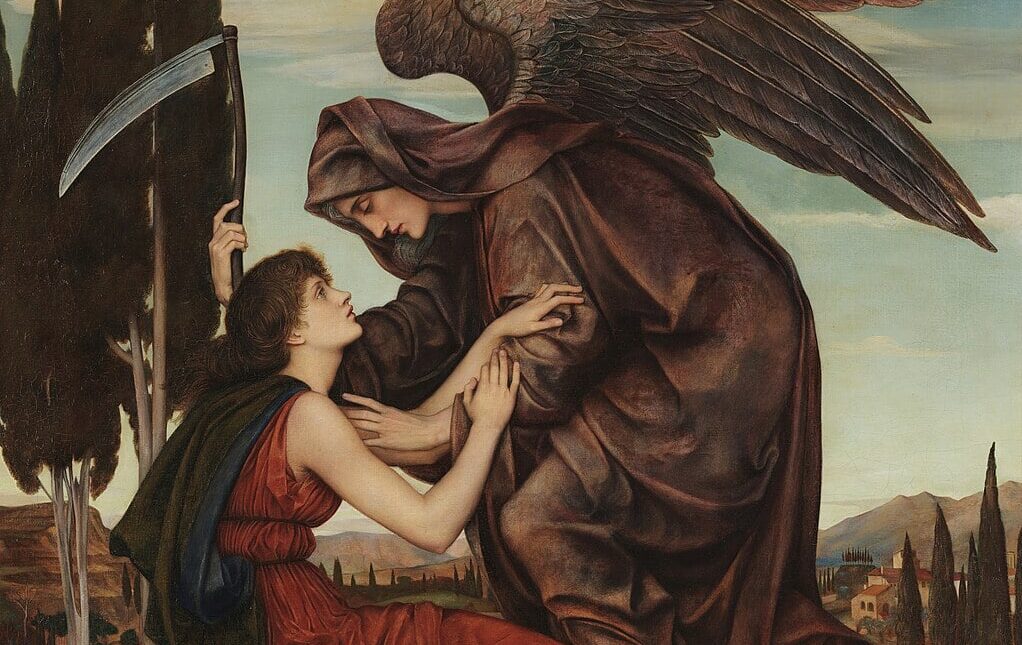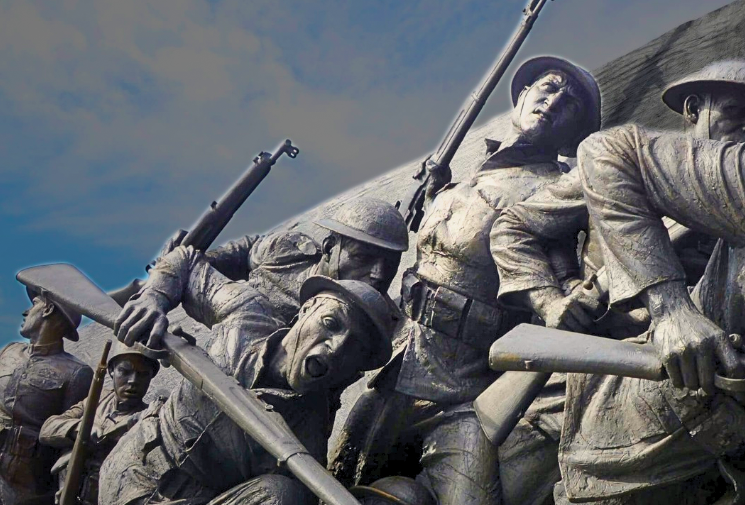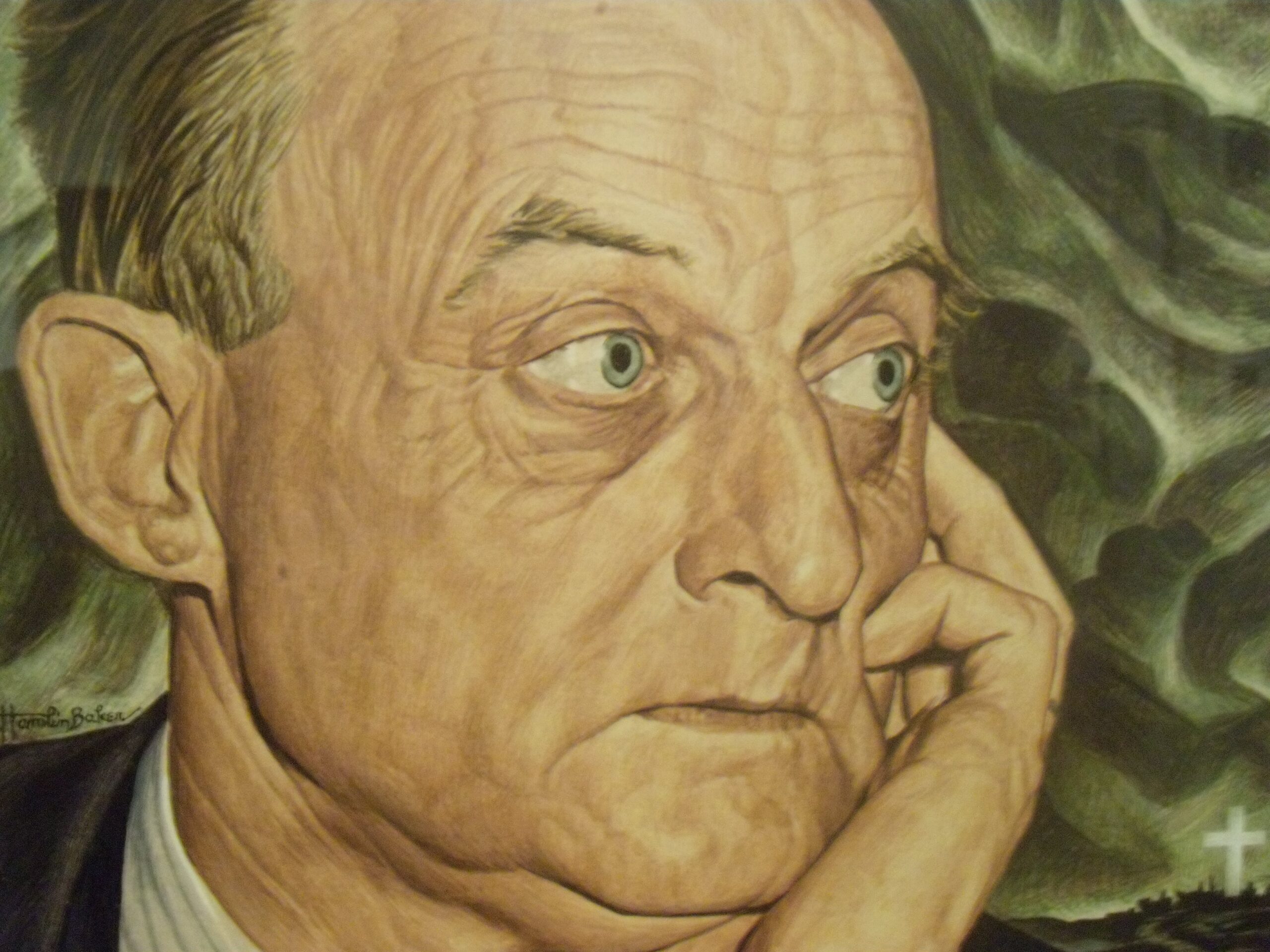This essay appears in the Spring 2019 issue of Modern Age. To subscribe now, go here.
In 1967—just over half a century ago—Francis Graham Wilson published a study of Spanish traditionalist thought. Wilson, a little-remembered political theorist teaching at the University of Illinois, was instrumental in focusing the attention of American conservatives on parallels between Spain and representative government in the United States.
What, if anything, is there in the Spanish experience to recommend to our examination of the fragility of democracy in America in the twenty-first century? Is there evidence that the United States today may be heading toward a civil war like that experienced by Spain in the twentieth century? Francis Graham Wilson was already ahead of his time in asking such questions when he wrote Political Thought in National Spain more than fifty years ago.
Like better-known scholars Eric Voegelin and Leo Strauss, Graham was a student of classical philosophy and brought to his study an understanding of political order and the conflict between Enlightenment reasoning and traditional thought. Wilson was an American, however, unlike Strauss and Voegelin, who were European émigrés. He was also a political conservative and a Catholic convert who appreciated the role of the Catholic Church in Spain and saw danger in the animosity toward religion of the French ideologues, whose ideas altered the course of Spanish history from the nineteenth century onward.
His study of Spanish political thought is an act of recovery of the writings and ideas of Spanish conservatives who, in their defense of tradition, political order, and Christianity, are very much like American political conservatives. Virtually unknown in America, few books and essays by Spanish traditionalists are available in English translation, so Wilson and a handful of specialists had to keep their ideas alive for an English-speaking audience.
American thoughts readily turn to England or France, but Spain is more often an afterthought, a destination at the end of a European vacation. Seldom is Spain an intellectual journey. Yet disorders that are present in American civil society in the twenty-first century were present in Spain in the nineteenth and twentieth centuries. Spanish traditionalists who sought to overcome the failures of Spanish politics and culture, therefore, may be guides to understanding our own troubles. That is what Francis Graham Wilson thought.
* * *
In Roman times, the Iberian Peninsula now occupied by Spain and Portugal was known as Hispania. In AD 711, Hispania was invaded by the Umayyad Caliphate, one of four Caliphates formed after the death of Muhammad. Christian Europe was compelled to confront a rising Islam. Charles Martel pushed back Islamic raids into France in 732, but in Hispania, now known as al-Andalus, Muslims were dominant for more than 780 years until the Reconquista in 1492.
Ferdinand and Isabella ruled the Iberian Peninsula at the end of the fifteenth century and affirmed the Catholic faith as the official religion. Their grandson, Charles, established the Hapsburg dynasty in Spain. Coinciding with the Hapsburg dynasty, Spain experienced a Golden Age in literature, art, and music, the era of Calderon, Lope de Vega, Cervantes, Velázquez, Tomás Luis de Victoria, and Francisco Guerrero.
In 1700, Charles II, the Spanish Habsburg ruler, died and named the sixteen-year-old grandson of Louis XIV of France as his successor. Fearing a Spain controlled by France, a war of succession was waged by the Hapsburgs—whose archduke, Charles, had support within Spain—in league with France’s rival, England. Thus erupted a series of wars with major European powers from 1702 to 1714 that left Spain weakened and divided.
Ninety-four years later, Napoleon Bonaparte invaded the Iberian Peninsula and established his brother, Joseph, as king of Spain. With the introduction into Spain of the French esprit revolutionnaire that accompanied Napoleon’s conquest, many Spanish intellectuals turned against the monarchy, the Catholic Church, and Spain’s system of autonomous fueros (regions).
Their influence led Ferdinand VII (1808–1833) to abrogate Spain’s “Semi-Salic Law of Succession,” replacing his brother Carlos Maria Isidro’s (1788–1855) claim of succession to the throne with that of the king’s infant daughter, the future Isabel II. That decision also meant that after Ferdinand’s death, his wife, Maria Cristina (1806–1878), became regent and in effect ruled Spain until she herself was deposed.
Under her minister, Juan Álvarez Mendizábal, the regime persecuted the Spanish Church, outlawed most male religious orders, shut down more than 1,500 monasteries, closed the majority of schools and charitable institutions run by religious orders, abolished the tithe, and monitored religious publications. The regime also confiscated Church property, thus creating a new class that, according to the historian of Spanish traditionalist thought Alexandra Wilhelmsen, “owed its material well-being to the Revolution, thus increasing the number of supporters of the new liberal State.”
Ferdinand’s brother, known as Carlos V to his supporters, was compelled to think through what was happening to his claim to the throne and, as a consequence of the king’s actions, to Spain. Dubbed “The Pretender” by those who rejected his claim, Carlos V in 1833 launched the first of four Carlist Wars, a split between members of the Royal Family that was mirrored in Spanish society.
During the lifetime of Ferdinand VII, Spanish traditionalists, known as realistas, advocated:
- acceptance “of the historical Catholic unity” of Spain;
- rejection of revolutionary ideas that were not Spanish;
- rejection of the creation of a new Spain via liberal “constitutionalism,” as Spain, these realistas argued, was hundreds of years old and its historical experience and institutional legacy was the basis of civil society;
- reliance on the legislative Cortes, but with limited powers;
- defense of regional autonomy, or the fueros—i.e., a vigorous regional government and a small national government;
- “sovereignty” represented in the person of the king, not by popular election; and
- opposition to the Enlightenment notion of division of power.
As Alexandra Wilhelmsen writes in her contribution to a Festschrift for her father, Saints, Sovereigns, and Scholars: Studies in Honor of Frederick D. Wilhelmsen, the principle of the realistas was that “the political realm should reflect . . . power . . . personified in the king.”
This program was summarized by Wilhelmsen in four words: “God, Fatherland, Fueros, King.” After Carlos VII’s death, the realistas became known as Carlists.
* * *
In 1967, in light of his reading in the history of traditionalism in Spain, Francis Graham Wilson was compelled to ask whether America would follow the course taken by Spain in the twentieth century, including acceptance of socialism, hostility toward limited government, rejection of religion, and civil war.
In searching for documents in which non-Spanish readers may find evidence of affirmation of traditional order in Spain, we can turn to Carlos V’s “Manifesto to the Spaniards” of February 20, 1836, and the works of Juan Donoso Cortés (1809–1853), Rev. Jaime Balmes (1810–1848), Marcelino Menéndez y Pelayo (1856–1912), and Ramiro de Maeztu (1875–1936).
Perhaps best known, Donoso Cortés was a Spanish diplomat and descendant of the conquistador Hernando Cortés (1485–1547), who destroyed the Aztec Empire and brought Mexico under the sovereignty of the King of Castile.
Like many Spanish intellectuals who came of age after the French Revolution, Donoso Cortés was captivated by L’esprit revolutionnaire until he was “mugged by reality” and realized that his earlier attraction to Jean-Jacques Rousseau and his “General Will” was contrary to real political order. Cortés countered that ideology by affirming the universality of mankind and human solidarity: “Humanity is a living and organic unity which absorbs all men, who in place of constituting it are only its instruments.”
Deeply religious, Donoso Cortés wrote, “It is essential to [liberalism] to repress alike all supreme affiliations and all radical negations, and thus, by means of discussion, it confounds all ideas and propagates skepticism.” And of socialism he wrote, “The strength of socialism consists in its being a system of theology.” Donoso Cortés believed that the intellectual crisis of Europe was “too profound to be cured by liberal devices.” Concessions to the Enlightenment were impossible—Donoso Cortés turned to St. Augustine, Bossuet, and Vico.
Rev. Jaime Balmes would second Donoso Cortés’s views: “the Catholic religion may fearlessly claim the gratitude of the human race, for she has civilized the nations who have professed her, and civilization is true liberty,” he wrote. A Catholic priest, Jaime Balmes believed Martin Luther had “sowed the seeds of endless trouble by the extravagant doctrine that a Christian is subject to no one.” Rousseau he also rejected. “Rousseau is a miner who saps in order to overturn.”
In seeking a philosophy to counter Rousseau, Balmes turned to St. Thomas and his concept of just law that, derived from the eternal law, is binding on conscience. He wrote: “In that of St. Thomas, law is the expression of reason, in that of Rousseau, the expression of will; in the former, it is an application of the eternal law, in the latter, the product of general will.” We should remember the influence of St. Thomas among nineteenth-century Spanish traditionalists when we reflect upon the closing of the soul of Catholic higher education in the United States.
Loss of cultural knowledge was lamented by Marcelino Menéndez y Pelayo, a Spanish scholar who sought to recover the greatness of Spain’s intellectual heritage. Best known for Historia de las ideas estéticas en España (1881–1891), his edition (1890–1903) of Lope de Vega, his Antología de poetas líricos castellanos (1890–1906), and his Orígenes de la novela (1905), Pelayo was nominated five times for a Nobel Prize in literature. In “Indications of Spain’s Intellectual Activity in the Last Three Centuries,” Menéndez y Pelayo bemoaned that “Our books are forgotten.”
But perhaps the most forceful advocate of Spanish traditionalism was the political theorist Ramiro de Maeztu. Maeztu was a member of the “Generation of ’98” that faced the reality of Spain’s decline after the Spanish-American War.
He lamented the acceptance of “humanism” that by the end of the sixteenth century had dominated Europe, which led to a loss of consciousness of man’s living in sin. That in turn shaped the idea of the “state” as supreme.
Maeztu traces the idea of the state from Hobbes, who argued that the state was founded on necessity, through Rousseau, who asserted man’s natural goodness and gave to the state, in Maeztu’s words, “supreme, unique, and absolute power.”
The unity of the power of the state, which all the political theories of the modern age affirm, worked against the principle of subsidiarity. In Spain, stability had been given to political order by socially corporate institutions—the family, Church, guilds—which were dissolved by the discovery of human personality in the Renaissance. There were consequences: “the clergyman left the Church to become a humanist, a heretic, or the minister of a king.” The landlords neglected their duties and saw in their properties only a source of income, which they needed in order to live at the royal court.
In Germany the state eventually became an ethical ideal, and German children were taught that “goodness is immanent in the State.” The “hedonistic ideology” of France also came under Maeztu’s critical eye, as did laissez-faire economics.
Maeztu lamented a lost opportunity to reshape Spanish university education: he felt that General Primo de Rivera, as prime minister of Spain from 1923 to 1930, was too busy “to engage in any popular education that might touch the people. The general had permitted all of the key positions in Spain, especially the professorships in the universities, to remain in the control of the liberal and socialist enemies of the Spanish tradition.”
Maeztu’s enemies were not too busy that they forgot him. He was murdered by Republican soldiers in 1936 after the Nationalist uprising against the Second Republic.
Dynastic turmoil that included the murder of Catholic priests, and the dominance of L’esprit revolutionnaire among the intellectuals, had contributed to the departure of King Alfonso XIII in 1931 and the proclamation of the Second Republic. The brutal Spanish Civil War (1936–1939) was fought between Spanish leftists defending “the Republic” and traditionalists who joined forces with the Spanish military led by Francisco Franco, who subsequently established an authoritarian regime that satisfied few except Franco sympathizers.
* * *
We begin to see some affinities with Spain after World War II, when the recovery of classical philosophy by American scholars informed their rejection of the influence of Rousseau. In turning away from the Enlightenment, some American conservatives still affirm the natural law teaching of St. Thomas.
The American defense of the Constitution as a fixed body of law founded on a philosophy of limited government is very similar to the Spanish traditionalist defense of properly ordered government. Americans share rejection of centralized power in the administrative state as well. Alas, the extreme “tribal” divisions in American civil society in the twenty-first century are also reminiscent of divisions in Spain that led to civil war.
Liberty, which we Americans cherish, originates in Christianity and religious truth. Francis Graham Wilson emphasized that we should not ignore “tradition” as an existing body of judgments or truth: tradition “is a kind of deposit of political faith,” he wrote, and a “profound attachment . . . to a community of truth.” Integral to that community is a belief in Providence. Thus Donoso Cortés saw the hand of Providence when England was a balance to the power of Revolutionary France.
American political conservatives also have a love for the liberal arts and share the concern of Spanish traditionalists regarding the role of universities in shaping the intellectual classes. Wilson writes: “The interpreters of a culture do not just happen. They are ‘formed.’ Is not this the most important of questions? Who makes the intellectuals—the writers, artists, and leaders of politics and religion—in a modern society?”
Had the universities of Spain turned against revolutionary ideology, the tragic history of that country’s civil war and the resulting authoritarian military regime might have been avoided. That is an important lesson to remember as we come to appreciate the transformation of America’s liberal university system into a “Left University” and ask if we Americans may be heading down the road to civil war from which Spain, even today, has barely recovered. ♦
Richard J. Bishirjian is the author most recently of The Coming Death and Future Resurrection of American Higher Education.
Founded in 1957 by the great Russell Kirk, Modern Age is the forum for stimulating debate and discussion of the most important ideas of concern to conservatives of all stripes. It plays a vital role in these contentious, confusing times by applying timeless principles to the specific conditions and crises of our age—to what Kirk, in the inaugural issue, called “the great moral and social and political and economic and literary questions of the hour.”
Subscribe to Modern Age »












